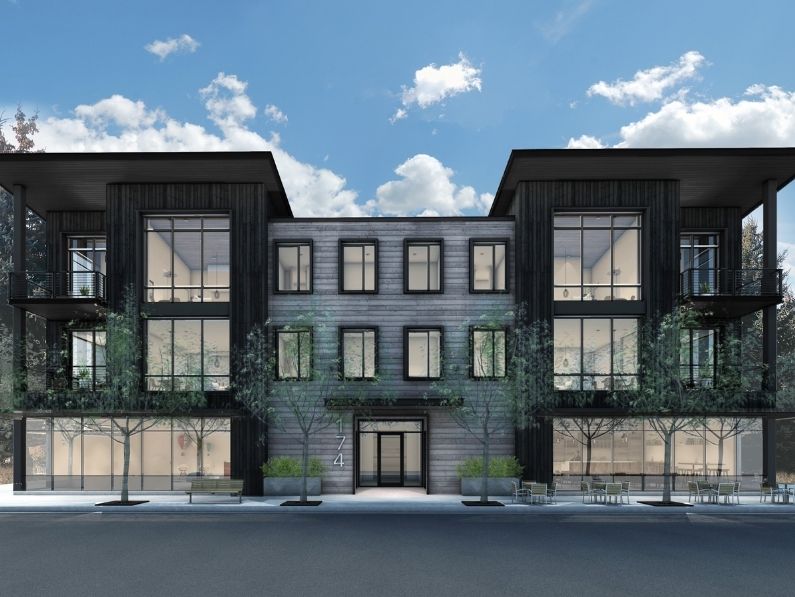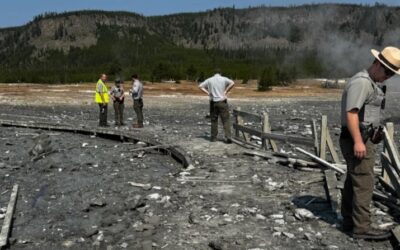Construction is already underway at 174 North King Street. It’s the latest project by the Jackson Hole Community Housing Trust, a private nonprofit currently serving over 400 people. Executive Director Anne Cresswell said, despite the pandemic, the project has remained on schedule.

Anne Cresswell has served as Executive Director for the Jackson Hole Community Housing Trust since 2003. (Courtesy Photo)
“So far, we’ve had nothing but success,” she said. “We’ve been incredibly fortunate. We’ve not experienced any supply chain disruptions. Financing has been as smooth as we could have hoped.”
The King Street Development broke ground in May, and is on schedule to be completed by September 2021. The Trust has already been accepting applications from people in the service industry, construction industry, professional industries, healthcare, and education, among others.
“Probably ten of the 24 units are spoken for, and we just have about five people that are under consideration and investigating the opportunity at any given time,” Cresswell said. “We’re trying to give applicants a huge lead time to get financially ready to close on this opportunity and to get their ducks in a row.”
The project is designed to cater to those making 75 to 120 percent of the median household income in Teton County. According to recent statistics from the U.S. Department of Housing and Urban Development, the median income rate is just under $93,000 per year for a single individual. That’s among the highest rates in the U.S. For a household with three people, that rate balloons to almost $120,000 per year.
“So for that reason, we really see the widest range, I would say you can imagine, of households that have applied to be a part of our program,” Cresswell said.
Overall, Cresswell said that about 300 applicants are on the Housing Trust’s waitlist to receive consideration for King Street or other developments. Many wait months or years to get off the waitlist. Cresswell has been working with affordable housing for about 20 years, and has seen how much it matters to the lifeblood of Teton County.
“The more time I spend working on the affordable housing issue, the more it is apparent to me that the quality of our health care system, and the quality of our education, are all a function of the dedicated, committed, compassionate people that serve these organizations and these agencies that we all rely on every single day,” she said.
With housing limited housing options, talented people often can’t make it work here.
“And the more turnover you have—the more you struggle to recruit employees from across the country—the more our community suffers and the more the quality of life experience in our community suffers.
The Housing Trust is just one local entity addressing affordable housing in the valley. There’s also Habitat for Humanity and the government-run Jackson/Teton County Housing Department, which serve slightly different income ranges. April Norton is Housing Director for Jackson/Teton County, and she works with all three major entities to help plan and develop more local housing.
“Although we all serve people who are in the workforce and generally earn less than 120 percent of median family income, we each calculate it slightly differently,” she said. “And I actually think that it’s a strength of our overall program because we’re able to provide housing for different income ranges and different types of households.”
Prior to 2015, the three main affordable housing developers in the valley competed for the same funding in order to build housing. But in 2015, a Housing Action Plan created the more collaborative organization of today. And Norton said the community is better off for it. There are fewer public risks and more nonprofit involvement in each development, and therefore, there’s more being built.
“We’ve got seven projects going, but we aren’t the developer on any of them. And what that does is it allows us to spread out our money that we have, and it mitigates the public’s risk,” Norton said. “In my estimation, I think it’s working, and I think we’re seeing a lot more housing getting built now than we were seeing five, six years ago. And that’s a really good thing.
Part of Norton’s job is assessing the needs of the community with what’s being planned and built. In the last few years, she was really short on workforce housing, a program intended to cater to those earning more than 120 percent of the median income in Teton County. Often, people in that range still can’t afford a market-rate home.
“Unless it’s a home that has a deed restriction on it, if it sells, it’s likely going to go to the highest bidder, whether that’s a local working family, or more likely a developer, or a second or third homeowner, or a transplant who’s coming to the valley,” Norton said.

April Norton joined the Jackson/Teton County Housing Department as its first director in 2016. (Courtesy Photo)
Minimum wages have also not been going up locally as fast as median income rates, so those on the low end of the spectrum now require more attention. About 34 percent of what’s currently being developed is classified as workforce. The other 66 percent is affordable, which is intended for anyone earning below 120 percent of Teton County’s yearly median income.
“I think the sweet spot for us is probably 20 percent workforce units and 80 percent affordable,” Norton said. “We need to build more affordable units because we have so many households that are in that affordable range.”
And King Street, despite its high price tag per unit, fits into that affordable range. Norton said that it’s ok if not everyone qualifies for every unit. It would be impossible, given the range of people she serves.
“That’s an urban, expensive build and they are going to skew to those higher income ranges,” Norton said. “We are also working on a project that’s 24 low-income rental units. So not every project is going to serve every person.”
Norton also said that she’s simply working with the resources she has. 100 percent of her capital funding was cut this year. But, there are still more units coming. And before COVID-19 hit, vacancy rates in some of the larger local apartment complexes were going up slightly.
At King Street, at least 50 more people will have an improved housing situation than they previously had by September. It’s a small step, but it does make a big difference for a group of people that needs the space, too.





